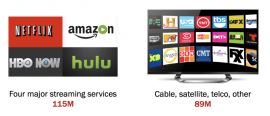Why Netflix may have to introduce ads and how TV is becoming a programmatic medium


On Wednesday, Netflix exceeded expectations with its Q1 earnings report. However, investors were met with disappointment following the company’s weak guidance for next quarter.
Netflix revenues were $4.52 billion compared with consensus expectations of $4.50 billion – a 22 percent increase year over year. The company also attracted a record 9.6 million new subscribers worldwide, bringing total Netflix subscribers to roughly 156 million globally.
Streaming passes cable for the first time. In 2018, streaming usage in the U.S. surpassed cable and satellite for the first time. There were a total of roughly 115 streaming subscribers for the major services combined. Cable and satellite had just under 90 million subscribers at the end of 2018.
Streaming subscriptions overtake cable (U.S.)
Source: Company data, Reuters estimates (2018)
Market more complex than it appears. Netflix and streaming have partly disrupted cable and various analyst forecasts see the trend continuing: streaming growth and cable subscriber losses for the next five years. However as the cost of streaming rises (e.g., YouTube TV increased prices to $50 per month) and more services appear (i.e., Disney, Apple) growth may slow and reach a kind of market equilibrium.
A 2018 CNBC survey found there were a mix of subscriber categories in the market: people who buy cable or satellite only, subscribers who invest in streaming only and a mix of both (the largest single group). The latter category (cable and streaming) will probably continue to lead for the foreseeable future.
Cord cutters and streaming subscribers in U.S. (2018)

Source: CNBC consumer survey (2018)
The ‘last mass medium.’ TV was regarded by many large agencies and brands as the “last mass medium.” But the rise of OTT and CTV, as well as “advanced” or data-driven linear TV, means that markets increasingly can target “TV audiences” as they would desktop or mobile users. (This obviously doesn’t happen on Netflix, which has no ads — yet.)
However, it’s probable that Netflix will introduce some limited form of targeted advertising in the next couple of years for several reasons:
- The inventory could command a TV-like premium
- The audience would likely accept limited pre- or post-roll ads; in-program ads would be different
- Wall Street would likely cheer such a decision
- Production costs and investor revenue expectations support the move
Why we should care. Increasing volumes of TV/video inventory will be “addressable” and accessible through programmatic exchanges. Some targeted inventory on the big platforms is and will be outside the exchanges. However nearly all of it will be capable of the same kinds of audience targeting — and accountability. Already, companies such as Simpli.fi, PlaceIQ, Placed, NinthDecimal and others can match ads that appear during TV programming (CTV/OTT) with offline store visits. OTT and CTV inventory will also be available for retargeting, based on intent or behavioral signals and data from other screens and channels.
Marketers seeking to reach “TV audiences” will increasingly buy audience segments, intent signals and behaviors rather than Nielsen-style audience demographics for specific shows.
So even as the cable TV audience is further disrupted and fragmented, increasing volumes of “programmatic video” inventory will make new kinds of audience segmentation, targeting, analytics and attribution possible.
The post Why Netflix may have to introduce ads and how TV is becoming a programmatic medium appeared first on Marketing Land.
From our sponsors: Why Netflix may have to introduce ads and how TV is becoming a programmatic medium



